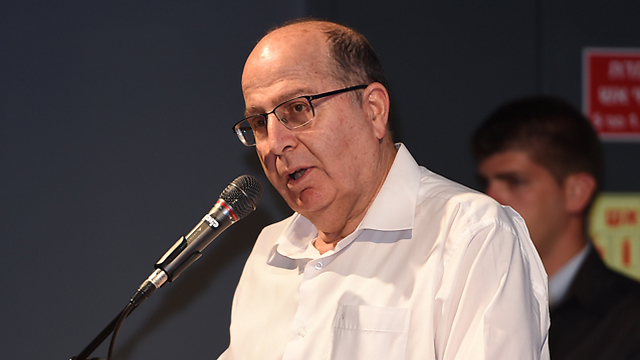Maj.-Gen. (res.) Gadi Shamni says officers should speak their minds as ‘army of Yes-Men’ is dangerous for Israel’; while Maj.-Gen. (res.) Avi Mizrachi argues ‘opinions should be expressed in the right forum, not in the media.’
Even though Prime Minister Benjamin Netanyahu and Defense Minister Moshe Ya’alon have “settled their differences” on Monday following Ya’alon’s comments the night before urging the IDF’s top brass to continue “speaking their mind,” several senior officers in reserves came out in support of the defense minister.
The controversy was prompted by comments this month by IDF deputy chief, Maj.-Gen. Yair Golan, who compared recent trends in Israeli society to the atmosphere in Nazi-era Germany. Netanyahu called Golan’s statement, made in a speech marking Holocaust memorial day, as “outrageous” – while Ya’alon supported the general’s right to speak.
On Sunday, Ya’alon encouraged top military generals to continue speaking their mind in public, even if their comments contradict government sentiments.

“Do not be afraid. Do not hesitate,” Ya’alon said. “A good army is an army whose commanders, junior and senior alike, feel confident in their ability to speak their mind at all times. Continue to act in keeping with your human conscience and compass, and not to follow the way the wind is blowing.”
An outraged Netanyahu countered that military officials can speak freely in closed circles, but should not delve into political disputes in public. Ministers in his Cabinet largely lined up behind him on Monday.
Following their meeting, Netanyahu and Ya’alon issued a joint statement denying any dispute and asserting that “officers are free to express their opinions in the relevant forums.”
Meanwhile, former GOC Central Command Maj.-Gen. (res.) Gadi Shamni told Ynet that “it’s a good thing that the defense minister urged officers must speak their minds. An army of ‘Yes-Men’ is dangerous for Israel.”
Shamni went on to say that “there’s a direct link between the courage to say things that could cost one a personal price—because they challenge one’s commanders—to the courage to take initiative on the battle field. Speaking on morals and ethics is the duty of every commander.”
Maj.-Gen. (res). Avi Mizrahi, also a former GOC Central Command, noted that “there is a great chasm between what officers say and the politicians, and you must say what you think in the right forum, time, and context.”
He argued that IDF deputy chief Maj.-Gen. Yair Golan’s comments “were not contaminated with politics – so there is no problem with them.”
Mizrahi noted that Ya’alon made similar comments when he was the chief of staff as well. “When you need to state your opinion, even a professional one, do so at the right forum.”
“That’s what I think Bogie (Ya’alon) meant. Bogie didn’t mean to say that (IDF chief Gadi) Eisenkot or (GOC Central Command) Roni Numa or (deputy IDF chief) Yair Golan should get up and say ‘we think Israel needs to withdraw from the territories’ and talk to the media about it. That is not their job, and if they think so – they should say so in the right forums.”
The head of the Institute for National Security Studies (INSS), Maj.-Gen. Amos Yadlin, asserted that “it is the duty of officers and commanders in the IDF to express their positions and assessments with professional integrity, and the duty of the political leadership to safeguard the top military brass’s freedom of thought and expression.”

Commanders for Israel’s Security, a movement that brings together some 200 senior security officials in reserves, also backed Ya’alon.
“Senior officers are supposed to express their opinions both on matters of national security and on the IDF’s values,” the movement said. “The defense minister did well to see the difference between independence of thought and obeying decisions. Ya’alon provides a faithful expression of these values, which were formulated by (first PM) David Ben-Gurion.”
Former Mossad chief Shabtai Shavit asserted that “the IDF—which constitutes the most important asset we have—must be completely above and outside of politics. Recently, politicians, among them the decision-makers, have been pushing the military into the political playground, and I don’t think the State of Israel can afford this ‘pleasure.'”
He criticized the prime minister’s decision to summon the defense minister to his office to rebuke him, and said “the right time to handle this issue was when it first began. If the prime minister felt the need to reprimand the deputy IDF chief, he should’ve done so in a private conversation and not in front of the media and the public, and explain why he thought (Golan’s) comments were inappropriate.”
Shavit said the defense minister “could not have just stood by without responding to the lashing out (against Golan), both by the heads of state and by thousands of ignorant people on social media.”
As reported by Ynetnews
